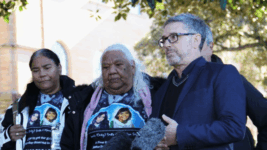The Offence of Indecently Interfering with a Body in New South Wales

Cindy’s Law is that which enables the conviction of a person for a sexual offence or an offence concerning conduct with a corpse without the need to establish whether the conduct occurred whilst the person was alive or deceased.
The law provides that where a person is charged with an offence of misconduct with regard to corpses under section 81C(a) of the Crimes Act 1900 (NSW), the fact finder (whether a magistrate, judge or jury) may deliver a ‘special verdict of sexual offence or misconduct with regard to corpses’ if satisfied beyond reasonable doubt that the defendant committed the offence, but is not sure about which offence was committed due to their uncertainty regarding whether the victim was alive or deceased at the time.
A long campaign
The New South Wales parliament passed Cindy’s law on 11 September 2025, following a 37-year push by the family of deceased First Nations girls Mona Lisa Smith and Jacinta Rose ‘Cindy’ Smith, with the assistance of the National Justice Project (NJP).
Mona, a Murrawarri and Kunja girl, was just 16 years old and Cindy, a Wangkumara girl, was only 15, when two local persons from the New South Wales town of Burke came upon the apparently deceased cousins beside a car wreckage on the Mitchell Highway, along with the driver, then 40-year-old non-Indigenous man Alexander Grant, who was alive. The unfolding scene on the roadside would raise many questions and ultimately led to the calls for the introduction of the recently-passed law.
Mr Grant was charged with culpable driving and interfering with a corpse. The charge of interfering was later withdrawn due to questions about Cindy’s time of death, while a jury went on to acquit Grant of the remaining charge. But on request of the National Justice Project, the New South Wales coroner reopened a 1988 inquest into the deaths, which went on to recommend the change in law to ensure that a defendant can’t escape liability due to uncertainty about whether a victim was dead or alive at the time of the conduct in question.
During his 25 June 2025 second reading on the bill containing the law, New South Wales attorney general Michael Daley explained that the reform will enable a court to prosecute an individual “in circumstances where there is uncertainty about whether a victim was alive or dead at the time an offender commits an act of sexual interference”.
National Justice Project chief executive officer George Newhouse, whom Daley noted has been working tirelessly with the Smiths for many years on this matter, has welcomed the “hard-won” law reform, he praised the commitment of the First Nations families involved and noted that the reform is all about “ensuring that Aboriginal families are heard, respected and treated with justice”.
Failed by the criminal justice system
“For 37 long years, the families of Mona and Cindy Smith have carried the unbearable weight of grief and injustice, and their tireless pursuit of truth has been vindicated,” said Newhouse, on the day after the law was passed. “Mona and Cindy were vibrant, much-loved Aboriginal girls, whose lives were tragically cut short.”
“Their deaths devastated their families and communities,” the lawyer continued. “But the pain did not end there: it was compounded by a series of legal and institutional failures that denied their families dignity, justice and closure.”
Newhouse explained that the 2024 delivered inquest findings revealed that the legal system and the NSW Police Force failed the Smith family. He added that “one of the most harrowing elements of the case” was the fact that the NSW Director of Public Prosecutions dropped the charge of interfering with a body because it was uncertain as to whether Cindy was alive at the time she was defiled.
The lawyer further underscored that despite the charge relating to interference having been dropped prior to the 1990 criminal trial, the NSW coroner found there was sufficient evidence to prosecute Grant 35 years after the fact.
“We are grateful for the respectful and compassionate way the attorney general has engaged with the family throughout this process,” Newhouse further set out in the wake of the law passing. “This is about more than legal reform. It is about restoring trust, honouring lives lost and ensuring that Aboriginal families are heard, respected and treated with justice.”
A mechanism that serves to prosecute
Introduced on 25 June 2025, the Crimes Amendment (Sexual Offences and Female Genital Mutilation) Bill 2025 (NSW) was a piece of omnibus legislation that purports to close gaps in terms of sexual offences, and this included clarifying the criminal offences of female genital mutilation, prohibiting sexual acts in front of children and raising the age of a child to 18 when it comes to child abuse material offences.
“As the coronial inquest showed in stark detail, an offender can escape liability where sexual misconduct occurred, but a trier of fact is not able to be satisfied beyond reasonable doubt as to whether the victim was alive or deceased, due to the inconclusiveness about the time of death,” said the AG on introducing the law into parliament.
The bill inserted new section 80AH into the Crimes Act 1900 (NSW), which allows for a special verdict of either an accused having committed a sexual offence under division 10 part 3 of the Act, or indecently interfered with a dead body under subsection 81C(a), when time of death is unsure. The corresponding penalty via this verdict is the lesser that applies to the two offences captured.
The bill also amends the section 81C offence of interfering with a corpse, so that “indecently interfering with a corpse” under section 81C(a) carries 3 years imprisonment, while improperly interfering with a corpse under section 81C(b), which does not include sexual interference, still carries the previous penalty of 2 years inside.
The section 81C offence is also listed under schedule 1 of the of the Criminal Procedure Act 1986 (NSW), which means it is a table 1 offence that the prosecution or defence can decide to proceed with in a summary way in the NSW Local Court as will automatically happen, or either side can elect for the matter to be heard on indictment in the NSW District Court.
Justice into the future
Barrister Julie Buxton assisted the family during the 2023 inquest hearings. In the wake of the passing of Cindy’s Law, Buxton explained that the reform is important as it serves to “protect the legacy of deceased victims and their families who continue to live with insufferable pain”, as well as ensuring that “sexual offending does not go unpunished in the future”.
The legal professional added that the assurance that punishing such sexual offending has particular pertinence for First Nations women and girls, as they’re subjected to disproportionate rates of sexual crimes. Buxton also commended NSW coroner Teresa O’Sullivan for her recommendation and the state’s chief lawmaker for actioning the reform.
“We have waited too long for justice for our girls. Justice that will never come,” said Dawn Smith, Cindy’s mother, as her 37-year-long quest to ensure that justice is served in the future came to conclusion.
“I hope no one ever has to go through what my Cindy went through, but if they do, I am comforted that these changes might help them find justice. We will always love and remember our girls.”







